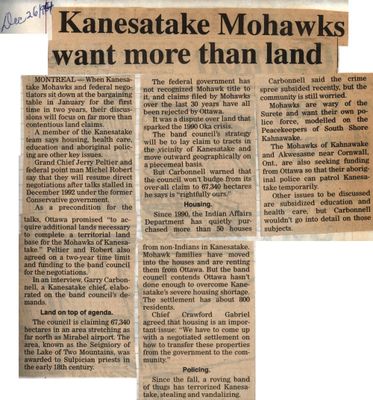"Kanesatake Mohawks Want More Than Land"
- Full Text
- Kanesatake Mohawks want more than land
MONTREAL - When Kanesatake Mohawks and federal negotiators sit down at the bargaining table in January for the first time in two years, their discussions will focus on far more than contentious land claims.
A member of the Kanesatake team says housing, health care, education and aboriginal policing are other key issues.
Grand Chief Jerry Peltier and federal point man Michel Robert say that they will resume direct negotiations after talks stalled in December 1992 under the former Conservative government.
As a precondition for the talks, Ottawa promised "to acquire additional lands necessary to complete a territorial land base for the Mohawks of Kanesatake." Peltier and Robert also agreed on a two-year time limit and funding to band council for the negotiations.
In an interview, Garry Carbonnell, a Kanesatake chief, elaborated on the band council's demands.
Land on top of agenda.The council is claiming 67,340 hectares in an area stretching as far north as Mirabel airport. The area, known as the Seigniory of the Lake of Two Mountains, was awarded to Sulpician priests in the early 18th century.
The federal government has not recognized Mohawk title to it, and claims filed by Mohawks over the last 30 years have all been rejected by Ottawa.
It was a dispute over land that sparked the 1990 Oka crisis.
The band council's strategy will be to lay claim to tracts in the vicinity of Kanesatake and move outward geographically on a piecemeal basis.
But Carbonnell warned that the council won't budge from its over-all claim to 67,340 hectares he says is "rightfully ours."
Housing.Since 1990, the Indian Affairs Department has quietly purchased more than 50 houses from non-Indians in Kanesatake. Mohawk families have moved into the houses and are renting them from Ottawa. But the band council contends Ottawa hasn't done enough to overcome Kanesatake's severe housing shortage. The settlement has about 800 residents.
Chief Crawford Gabriel agreed that housing is an important issue: "We have to come up with a negotiated settlement on how to transfer these properties from the government to the community."
Policing.Since the fall, a roving band of thugs has terrorized Kanesatake, stealing and vandalizing.
Carbonnell said the crime spree subsided recently, but the community is still worried.
Mohawks are wary of the Surete and want their own police force, modelled on the the Peacekeepers of South Shore Kahnawake.
The Mohawks of Kahnawake and Akwesasne near Cornwall, Ont., are also seeking funding from Ottawa so that their aboriginal police can patrol Kanesatake temporarily.
Other issues to be discussed are subsidized education and health care, but Carbonnell wouldn't go into detail on those subjects.
- Mystery Question
- Who is the publisher and author of this article?[Please answer by clicking on the Comments tab]
- Media Type
- Newspaper
- Item Types
- Articles
- Clippings
- Description
- "When Kanesatake Mohawks and federal negotiators sit down at the bargaining table in January for the first time in two years, their discussions will focus on far more than contentious land claims."
- Date of Publication
- 26 Dec 1994
- Subject(s)
- Personal Name(s)
- Peltier, Jerry ; Robert, Michel ; Carbonell, Garry ; Gabriel, Crawford.
- Corporate Name(s)
- Indian Affairs ; Mirabel Airport.
- Local identifier
- SNPL003173v00d
- Collection
- Scrapbook 6
- Language of Item
- English
- Creative Commons licence
 [more details]
[more details]- Copyright Statement
- Copyright status unknown. Responsibility for determining the copyright status and any use rests exclusively with the user.
- Contact
- Six Nations Public LibraryEmail:info@snpl.ca
Website:
Agency street/mail address:1679 Chiefswood Rd
PO Box 149
Ohsweken, ON N0A 1M0
519-445-2954



